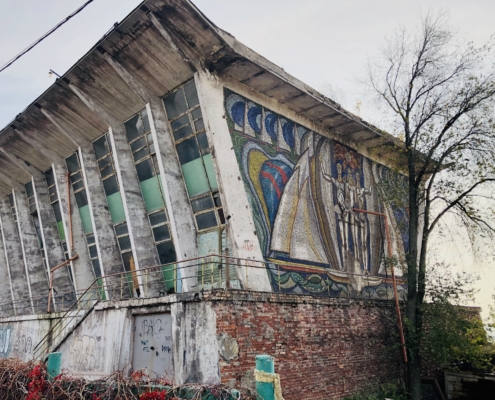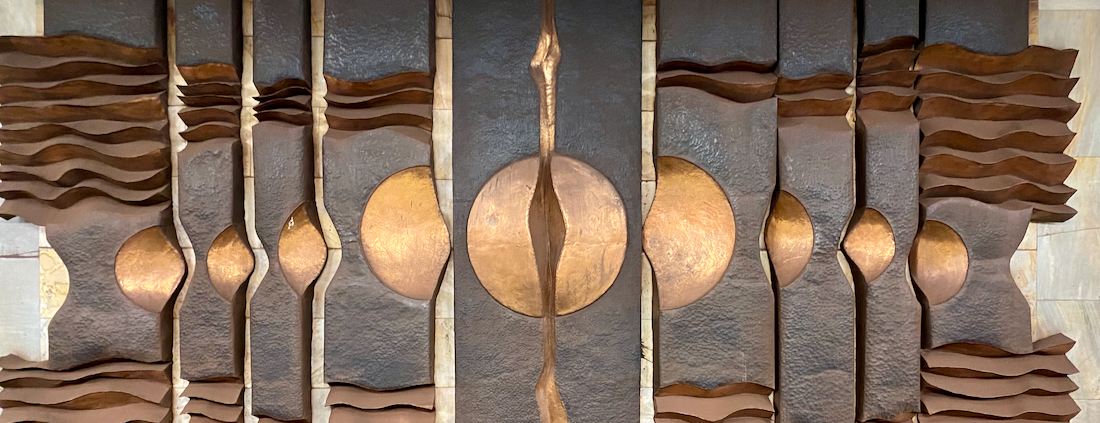Haven’t heard of Mariupol? There’s a good chance you’ll hear a lot about this heavily industrialized city in Ukraine’s south in the coming weeks, for the wrong reasons.
Almost three years ago, I observed the first round of the Presidential election in Mariupol. I described the experience in this medium post.

I’ve been back there several times since to watch focus groups. A lot has has changed! The city has benefitted from more attention from Kyiv and a young mayor. There’s now a smooth, fast highway from Zaporizhiya and more regular train service. The gardens and parks around town have been spruced up. There are a couple good restaurants and a lively contemporary art scene. Focus group participants volunteer their pride in the town. It’s a pleasure to visit, and not just because I like to look at the mosaics on its abandoned yacht club.
There’s more to it than meets the eye, too. A centuries-old population of Pontic Greeks live in and around Mariupol. Indeed, there are villages on the outskirts of town that look and feel Greek. They soften Mariupol’s otherwise hard visage. Ukraine is more diverse than it gets credit for, especially around the Black Sea.
What Hasn’t Changed in Mariupol
What hasn’t changed since 2019 is Mariupol’s position 25 km from the Russian border. It’s a strategic port city on the Sea of Azov and important for Ukraine. It was occupied when Russia invaded in 2014 and its villages were shelled. Sitting on the Line of Control, it’s hard to imagine it won’t be the first major city to be overrun if/when Russians push even farther into Ukrainian territory.
 Why should anyone care about the fate of a mid-sized Ukrainian city, pushed up hard against the Russian border? The biggest threat to Russia is hardly NATO expansion. Russia is threatened by the vibrant democracy on its border, defended by ordinary people like the ones I met doing tedious but critical election day work. Twice in the last two decades Ukrainians have taken to the streets to remove corrupt, undemocratic governments. They’d do it again, too. Russia compares unfavorably by every democratic measure and Putin knows it. That’s the expansion he is concerned about.
Why should anyone care about the fate of a mid-sized Ukrainian city, pushed up hard against the Russian border? The biggest threat to Russia is hardly NATO expansion. Russia is threatened by the vibrant democracy on its border, defended by ordinary people like the ones I met doing tedious but critical election day work. Twice in the last two decades Ukrainians have taken to the streets to remove corrupt, undemocratic governments. They’d do it again, too. Russia compares unfavorably by every democratic measure and Putin knows it. That’s the expansion he is concerned about.
There aren’t many success stories in this region. Ukraine is one of them and it’s 100% the result of Ukrainians’ commitment to democratic governance and holding their leaders accountable. I’ve seen survey data that say a third of Ukrainians would take up arms to defend the country against a Russian re-invasion. I don’t know if, compared to other countries, that number is high or low, if it’s enough or totally insufficient. But I believe it.
Ukrainians know how fragile their independence and their democracy is. I saw it on that election day and I hear it in every focus group. They think it’s worth defending. They’re right. Healthy Ukrainian democracy is in Europe’s and North America’s interests. It’s in Russia’s interest, too. But if Mariupol goes down, no one — especially in Europe — should be surprised at what comes next.
Contact QGS
Quirk Global Strategies has been working in Ukraine since 2006. In the past five years, Christine Quirk has observed hundreds of focus groups on topics ranging from politics and political parties, Russian disinformation, LGBTQ rights, women in politics and human rights in every corner of the country. Contact us and we can talk to you about your research options, with or without Russian occupiers.




